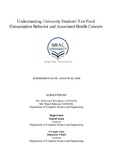Understanding university students’ fast food consumption behavior and associated health concern
Abstract
The aim of this research is to investigate the potential measurement of fast food consumption behaviour and the health hazard factor associated with it. Fast food consumption is getting more popular in Bangladesh, and we intend to capture the impact on the young generations. For this, we have drawn some questionnaires, gathered responses and tried to figure out the insightful information from this survey analysis using data-driven methods. A total of 170 university going students, of whom 122 were male (71.76%) and 48 were female (28.23%) constitute the sample of this research. We have analyzed the data with correlation analysis and chi-squared test to understand the behaviour of the features. Furthermore, we have used the K-means clustering algorithm to group students among their preferences while choosing a restaurant. In addition, we have used supervised machine learning models, Gaussian Naive Bayes, decision tree classifier (CART), Random forest classifier and Logistic regression to predict student’s fast food consumption rate where Naive Bayes performed best with 79.4% accuracy. The result draws a conclusion on university student’s health status and finds potential insights to fast food business.

